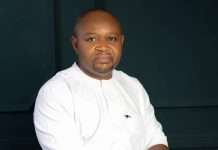
Towards curbing the prevalence of stroke and other cardiovascular diseases in the country, consultant cardiologists from the Federal Medical Centre, Asaba and Federal Medical Centre, Owo, have advised Nigerians on the importance of adopting healthy lifestyles to cut their risk of stroke and blood clot.
The medical experts who highlighted ten proven natural means of preventing stroke, classified risk factors for developing stroke into modifiable and non-modifiable factors. Modifiable risk factors according to them are hypertension, diabetes, smoking, immodest alcohol use, heart diseases- arrhythmias, heart failure, cardiomyopathy, valvular heart disease, congenital heart disease, infective endocarditis, etc, sickle cell disease, HIV, among others.
In an exclusive interview with Consultant Physician and Cardiologist, Dr Valentine Nnaemeka Amadi, of FMC Owo, he itemised lifestyle modifications that can aid prevention of stroke to include:
low salt diet,
low cholesterol diet,
adequate water intake,
adequate intake of fruits and vegetables,
moderate exercise which may need to be prescribed in some cases,
no smoking,
reduced or no alcohol intake,
regular medical check-ups and follow up as needed,
avoiding prolonged immobilisation, and
early risk stratification of suspected cases with anticoagulants.
He averred that uncontrolled hypertension is the commonest cause of stroke, while conditions of the heart leading to stasis such as heart failure and arrhythmias, also known as irregular heart rhythm, for instance atrial fibrillation, are other causes of stroke.
Dr Amadi further mentioned the non-modifiable risk factors for stroke to include: advancement in age, family history, previous history of stroke, male gender, as more males have higher risk of stroke than females, and black race.
Affirming the views of Amada, Dr Agoke Adekunke, consultant cardiologist, FMC Owo, identified the formation of blood clots as a risk factor for stroke, with common causes such as heart diseases, cancers, obesity and those who have undergone major surgery. In addition, he said families with inherited blood disorder like haemophilia, are also at risk.
Dr Adekunle, who also spoke with Pharmanewsonline in an exclusive interview emphasised the essence of early diagnosis and treatment of stroke, saying “It’s very important that when certain disease conditions which can lead to stroke are suspected, efforts must be put in place to begin early treatment. For instance, people who have atrial fibrillation (AF) must be risk stratified soonest to begin the blood thinners that may help.
“Also in the society at large, cutting down on weight if obese, avoiding prolonged immobilisation by initiating early ambulation if admitted on beds”.
Explaining the relationship between atrial fibrillation (AF) and stroke, he described AF as a disorder of heart rythms causing the heart to beat abnormally and the greatest risk associated with it is stroke. Many factors can make one to be at risk of stroke when there is AF such as those with underlying co-morbidities like hypertension, heart failure, diabetes mellitus and previous heart attacks. In addition, he said the older the patient and gender, more common with the males above 75 years and females above 65 years.
Again Dr Amadi stated that there are two types of stroke- Ischemic stroke and haemorrhagic stroke. While he differentiated the types of stroke according to their occurrences, he said clot formation falls under ischemic stroke which is divided into thrombotic and embolic stroke. Thrombotic stroke involves formation of plaques within the blood vessel wall which causes narrowing of the vessel diameter leading to poor perfusion of that region of the brain it supplies.
“In this case, the plaque does not get detached from the vessel wall. If it does, it has become an embolus (clot) giving rise to an athero-embolic stroke, a type of embolic stroke. But if the clot was formed within the heart as previously described, it’s a cardio-embolic stroke, the second type of embolic stroke”, he stated.
The cardiologist simply refers to haemorrhagic stroke as an acute bleeding within the brain caused by a ruptured blood vessel, and is most commonly caused by uncontrolled high blood pressure.










